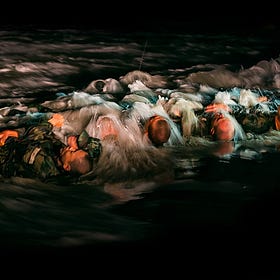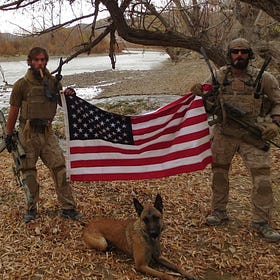No Trouble at All: Finding Meaning in Our Automatic World
Trading pixels for iron, to recreate an ancient resolve for all that may come.
Here is a PDF to read this essay on paper as opposed to pixels. As pixels are the subject of this piece, it seems right.
This essay is a riff on one of the core themes I like to cover here at What then?: why our world is what it is, what it once was, and how it is possible to live like our primal forbears once again.
We find a sense of meaning in response to the natural perils of the ancient world: floods, earthquakes, twisters, and enemies.
And we find meaninglessness in the absence of these same perils in the modern.
But this does not condemn us to meaninglessness in a world of lesser difficulties. Far from it. Rather, it tells us all too many are searching for meaning in the wrong places.
Where then do they look? How do they step outside of their world and see it in a different light?
One of my favorite ways of reframing our world is comparing it to the ancient world and identifying a thread to pull on. So let us turn to the nomadic pastoralists of the Tibetan Plateau where we find a striking source of meaning that can be applied to our own.
There is a common greeting among this tribe that arises in the form of a question: “E dKaa Thal?” which means, “Has there been difficulty?” One ethnographer describes how they usually answer this question: “I have traveled with Tibetans when the entire day has been a succession of disasters or near-disasters: loads thrown in bogs and streams; robbers evaded or, in head-on confrontation, bluffed off; rain all day, so hard that no noon halt was feasible and everyone went hungry and thirsty; what should have been fords become waters for swimming, with loads and cattle nearly swept away; and at the end we are a sorry bedraggled lot, but the answer, somewhat hoarsely defiant and denying all reality, remained true to form—Ma dKaa THal.”1
And this is where it gets interesting. To the question, “Has there been difficulty?” the answer, no matter how much difficulty had been endured, was always the same: “Ma dKaa THal” which means, “No trouble at all.”
No trouble at all.
I love paradox, and here we have one: our Tibetans can say “No trouble at all” about flood, enemy raiders, and a constant threat of death, while all too many at present say “Everything is going wrong” when a bit of political news plays on a pixelated screen or the WiFi shuts off.
It seems, then, we are left with two different definitions of trouble. My sense is they correlate to our initial question about meaning. This is a war between analog and automatic ways of life.
This is a war for the human condition—it is a war for meaning.
So let us lean into the analog world.
Our Tibetans did not find trouble in the analog world of flash floods, enemy horsemen, and freak ice storms, all of which could kill them at any moment. It is significant that iron sharpens iron. Our Tibetans demonstrate that our natural reaction to physical hardship is physical hardening.
But the not so obvious fact is this hardening comes with an analog mode of mind. Incremental hardships allow us to develop a comparative view of things: what is a rainy day compared to a robber with a rifle, and a robber with a rifle compared to a flash flood, and a flash flood compared to death? Irrelevancies. Nuisances not worth a muttered curse. And as a result of this analog mode of mind and these hearts of iron, we find a culture that mercilessly demands we be indomitable—killable yes, breakable no, with no patience for anyone who wants to inflict a cancerous plague of negativity on everyone around them.
Now let us lean into the automatic world.
It now becomes clear why so many in the automatic world find trouble in dropped signals and digital messages on a little screen that cannot harm us. Gone is the bone breaking trauma of Nature in her glory. Gone is the reaper on every hilltop waiting for a hint of weakness in order to strike. But legion are the abstractions that eat away at the corners of our minds in the “bitter watches of the night”: phantom vibrations, emails, calls, texts, posts, reminders, calendars, alerts, scrolls, rantings and ravings on every digital screen we look at.
The world of iron has given way to the world of pixels, and unsharpened bodies have followed suit: dropped chins, sloped shoulders, and a somewhat hesitant manner of walking. What a fascinating regression from the robustness of the “undeveloped” world to the fragility of the “developed”! And where the body goes, the mind follows: where are the epic comparisons that allow us to reframe the tiny miseries that add up over time? Where is the reminder of flood or enemy that can turn a breathless calendar app or a lie on main stream media into an amusing test of equanimity? And now our culture is a reflection of these truths: the heroism of rugged individualism is now mocked and replaced by the glorification of those who call themselves victims.
It seems, then, in the analog world, our meaning is discovered in each of our interactions with nature. In the automatic world, we are divorced from nature and everything becomes abstract and fragmented. Meaning, too, is shattered.
Is this perfect? No. But I think it is real enough to work with.
Thus the automatic world looks for trouble and I have a hunch as to why. Allow me a digression. My sense is the deep psychological reason for calling everything troublesome is a secret hope to bring about a biblical upheaval with our negative attitudes. As if through sheer pessimism, very loud sighs about WiFi, and angry rants about negative bits of news from every corner of the earth, the deeply troubled are convincing themselves to take the fanatically tribal voices on the fringes seriously: anarcho-primitivists crying “Civilization is enslaving us, let us live in the woods!” and accelerationists crying “Liberalism is decadent and must be driven to chaos, let us ensure only the strong survive!” and post-colonialists crying “Modernity rests on colonial domination, let us burn it to the ground!” And perhaps they will call forth lightning and blood and the shattering of the earth so that the savage reign of Nature may rule once again. If they scream “trouble” long enough and the automatic world gives way to the analog, they may, at long last, be forced to call nothing troublesome in order to survive each night. This is their way of being forced into meeting adversity with a grin and a laugh instead of merely choosing to.
The irony is that once they dip a toe in the brutal reality of the analog world, I imagine they will find themselves wishing to be back in the automatic world with $10 cups of matcha and heated bathroom tiles.
So much for apocalypse.
Let us sum it all up.
We find trouble here and not there for a number of reasons. One, we are built for a harder world. Two, our strength is the iron we are made of, but our strength is now our weakness for pixels do not sharpen iron. Three, we allow ourselves to be victims of our automatic environment instead of analogizing it. And four, we refuse to find meaning in our suffering, which means we refuse topractice a savage resolve in every single thing that happens, no matter how unjust, unfair, and unpredictable.
What then is the solution? How can we make this applicable to our automatic world and our everyday lives?
It is not to go backwards. The sheer brutality of the ancient world is proof of this. We must go forward.
Cicero said “What is a human life worth unless it is incorporated into the lives of one’s ancestors and set in a historical context?” Doing a bit of ethnography of our own, it is possible to see many men and women who say “No trouble at all” and they have one trait in common: they bring an analog mode of mind into the wonders of our automatic world. They trade pixels for iron.
They implement rites of hardship into each and every day until they are as much a part of life as breathing: lifting weights, walking or sprinting up hills in the sun or rain or snow, sweaty sessions in the sauna, a bit of water fasting, some martial arts, a few hours at the range.
The body responds, and the mind now has a counter weight to a pixelated way of life. Because what is a series of annoying posts on social media when we just rolled jiu jitsu or sparred or shot and our entire existence has been reduced to the next inhale and exhale? No trouble at all. What is a packed calendar app when our legs are flooded with lactic acid from hill sprints and we are here-and-now? No trouble at all.
Ours is the greater test, for our iron kinsmen were hard by necessity whereas we must be hard by choice. It is a good fight. And the beauty of all of this hardship is that it leads back to meaning—a savage resolve in finding meaning in every single thing that can happen from this point forward.
If you enjoyed this, please consider adding a like, restacking this essay, and sharing it with others.
This is how more readers find my work.
Ekvall, Robert B. Fields on the Hoof: Nexus of Tibetan Nomadic Pastoralism. Holt, Rinehart and Winston, 1968.






I wish I could/would write a more meaningful response like those before but instead: I sort of snickered to myself when reading. Too often my words are, "not a big deal" when others go on a tyrade about the line at Starbucks or the pause of their internet service. I spent 10 minutes staring at my couch yesterday wondering why it had to be plugged in. Could people no longer move the lever that raised their feet. Why do we drive to the gym when we could walk there? Why are (all, it seems) spaces automobile accessible but not made for the mobile who want to move a muscle.
Thank you for the morning read.
I stand in awe of your ability. This may be your best post ever, and that’s saying a lot. If I may be so bold, this sentence especially resonated and is the essence in my mind, “Ours is the greater test, for our iron kinsmen were hard by necessity whereas we must be hard by choice.”
On a lighter note, I dated a woman many years ago that I often joked about by saying she thought a hike was a bad parking spot at the mall.